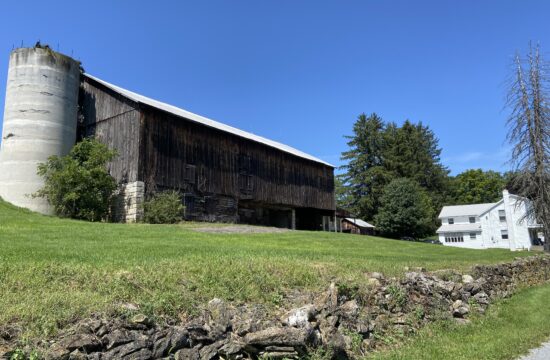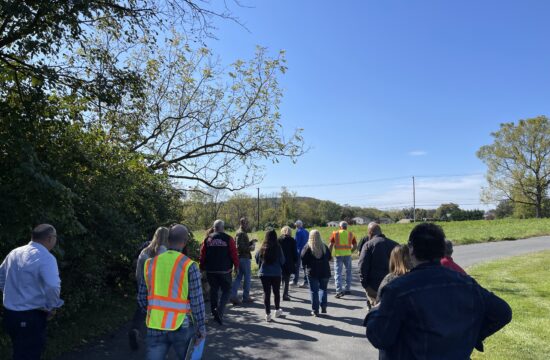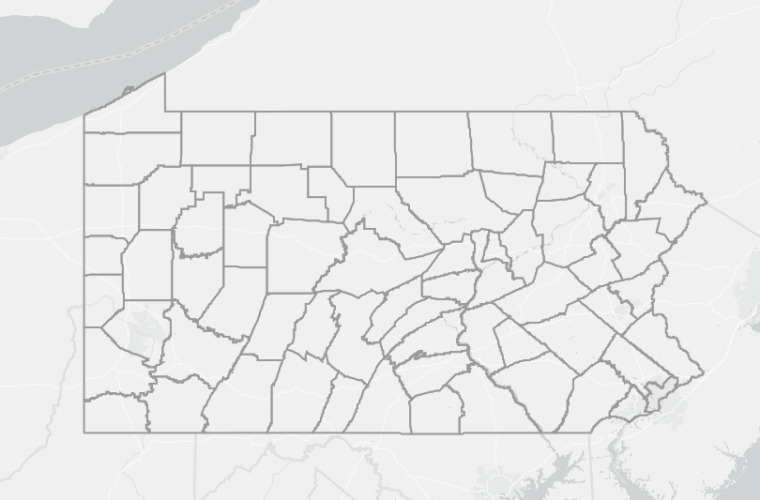PA Conservation-Related Laws
Act 29 of 2001: Conservation and Preservation Easements Act
The Conservation and Preservation Easements Act clarifies and strengthens various points of law concerning conservation easements. At its heart, the Act says that, as a matter of public policy in Pennsylvania, conservation easements conforming to this law are valid. Furthermore, where there is ambiguity in an easement restriction, the Act directs the courts to interpret the restriction consistent with the purposes of the easement and the Act rather than favoring a conservation-unfriendly view of the restriction language. To comply with the Act and to receive its benefits, legal counsel for nonprofits and government bodies should review the Act prior to drafting new or amending old easements.
Act 154 of 2006: Local Government Partnerships with Land Trusts
Act 154, signed into law on 11/29/2006 by Governor Rendell, facilitates local government partnerships with land trusts. The Act empowers local government units to:
- appropriate money to a land trust “for the acquisition or conservation and preservation of interests in real property for the purpose of achieving open space benefits…” (including costs of appraisals, legal services, title searches, document preparation, title insurance, closing fees and survey);
- transfer open space property interests to a land trust with or without consideration; and
- create a “Local Land Trust” subject to various accountability measures.
While a number of local governments and land trusts have found ways to partner on projects, Act 154’s authorization for the above activities will greatly facilitate partnerships. Additionally, the Act enables local governments (excluding counties in this case) to use voter authorized millage and earned income tax rate increases—previously confined for purchase of open space interests and retiring indebtedness incurred in acquisitions—to be used for incidental transactional fees such as appraisals and legal services. Additionally, the Act enables local governments (excluding counties in this case) to use voter authorized millage and earned income tax rate increases—previously confined for purchase of open space interests and retiring indebtedness incurred in acquisitions—to be used for incidental transactional fees such as appraisals and legal services.
Act 44 of 2011
Act 44 of 2011, signed into law by Governor Corbett on July 7, amends the Agricultural Area Security Law to repeal the provision allowing for the extinguishment of agricultural conservation easements created pursuant to the Agricultural Area Security Law after 25 years. Repeal of this provision has been a long-standing objective of the Pennsylvania Land Trust Association.
The Agricultural Area Security Law stated that:
An agricultural conservation easement shall be subject to the following terms, conditions, restrictions and limitations:
(3) … if the land subject to the agricultural conservation easement is no longer viable [emphasis added] agricultural land, the Commonwealth, subject to the approval of the State board, and the county, subject to the approval of the county board, may sell, convey, extinguish, lease, encumber or restrict an agricultural conservation easement to the current owner of record of the farmland subject to the easement after the expiration of 25 years from the date of purchase of the easement ….
The Law’s definition of viable is complicated and problematic, creating a great deal of uncertainty and making this provision potentially harmful to conservation. The provision is repealed, effective 60 days after July 7.
Whether the repeal is applicable to agricultural conservation easements established prior to the repeal is uncertain. Thus, while the potential problems presented by the 25-year provision have been eliminated for new easements, it is unknown whether older agricultural conservation easements that reach the 25-year mark can be extinguished under the now repealed 25-year provision. The grant of conservation easement by the farmer is explicitly stated to be in perpetuity. But does the now repealed provision in the enabling act have any present bearing on the easement? The answer is not clear. The state’s Agricultural Conservation Easement Purchase Program was established in 1988, making 2013 the earliest that a challenge to an easement could arise.
Maryland repealed its 25-year extinguishment clause in 2004. Pennsylvania’s Agricultural Conservation Easement Purchase Program was modeled after Maryland’s.
(Act 44 of 2011 also creates a definition of “contiguous” that includes lands separated by railroads and allows lands subject to agricultural conservation easements to be subject to underground mining of non-coal minerals.)
Act 13 of 2012
Governor Corbett signed Act 13 of 2012, the “Marcellus shale bill” or House Bill 1950, into law on 2/14/2012.
Act 13’s proponents point to the improvements the law makes in the regulation of natural gas activities, arguing that the law provides protections far superior to those that otherwise would have been provided under the status quo. The bill’s opponents point to the bill’s deficiencies, arguing that legislators could have done much better and that, in the case of local zoning control, the law is a step backward.
The Act amends Title 58 (Oil and Gas) of the Pennsylvania Consolidated Statutes, “providing for an unconventional gas well fee and for transfers from the Oil and Gas Lease Fund; providing for distribution of fees and transfers; establishing the Natural Gas Energy Development Program; consolidating the Oil and Gas Act with modifications and additions relating to definitions, well permits, permit objections, comments by municipalities and storage operators, well location restrictions, well site restoration, protection of water supplies, notification to public drinking water systems, containment for unconventional wells, transportation records regarding wastewater fluids, corrosion control requirements, gathering lines, well control emergency response, hydraulic fracturing chemical discharge requirements, bonding, air containment emissions, public nuisances, enforcement orders, well control emergency cost recovery, penalties, civil penalties, inspection and production of materials, witnesses, depositions and rights of entry, third party liability and inspection reports; providing for local ordinances relating to oil and gas operations and for responsibility for fee; making an appropriation; and making a related repeal.”
The Pennsylvania House voted 101-90 on 2/8/2012 to adopt the conference report on House Bill 1950, the Marcellus shale legislation. Being a conference report, no amendments were allowed, only an up or down vote. The vote largely followed party lines with 99 Republicans and 2 Democrats voting “yes” and 10 Republicans and 80 Democrats voting “no”. The conference report was adopted by the Senate on 2/6/2012 in a 31-19 vote (26 Republicans and 5 Democrats in favor and 4 Republicans and 15 Democrats opposed).
As natural gas industry operations take from our natural resources, the bill provides funding for Growing Greener-type projects to invest back into the conservation, restoration and enhancement of Pennsylvania’s land, water, wildlife and communities including the following:
Growing Greener – impact fee share: The Environmental Stewardship Fund, the funding source for Growing Greener, receives dedicated infusions of cash from a 10% share of the 40% statewide share of the impact fee. Senate Republicans estimate that this will generate $14M total for 2011 (retroactively) and 2012, $29M in 2013, $46M in 2014 and $48M in 2015.
Growing Greener – OGLF share: The Environmental Stewardship Fund also receives $20M from the Oil and Gas Lease Fund in 2013 and $35M in 2014 and beyond — assuming there is sufficient money in the fund after DCNR gets its allocation, which is determined in the annual budget and fiscal code process. It appears that this will require annual vigilance to ensure that the funding intent is honored.
CFA: From the statewide share of the impact fee, 20% will go to the Commonwealth Finance Agency (CFA), an entity controlled by legislative leaders. This pot of money is projected to grow to $26M annually by 2015. It will be up to the political process to determine allocations between allowed uses, but money must be used for the following:
- Acid mines: damage, abatement and cleanup and mine reclamation, with priority given to projects which recycle and treat water for use in drilling operations.
- Orphan or abandoned oil and gas well plugging.
- Complying with the Pennsylvania Sewage Facilities Act Planning acquisition, development, rehabilitation and repair of greenways, recreational trails, open space, parks and beautification projects.
- Programs to establish baseline water quality data on private water supplies.
- Watershed programs and related projects.
- Up to 25% of funds may be utilized for flood-control projects.
County Initiatives: From the statewide share of the impact fee, 15% will be distributed to counties proportionately based on the population of the county. Like the county initiatives under the Growing Greener 2 bond issue, each county will make its own decisions regarding use of the funds within the rules established by the state. The funds must be used for any of the following: the planning, acquisition, development, rehabilitation and repair of greenways, recreational trails, open space, natural areas, community conservation and beautification projects, community and heritage parks and water resource management. Funds may be used to acquire lands for recreational or conservation purposes and land damaged or prone to draining by storms or flooding.
General Limitation: All or most of the funds distributed as described above may “not be used for the purpose of public relations, outreach not directly related to project implementation, communications, lobbying or litigation.”
Land Acquisition Requirement: Funds may not be used by an authorized organization “for land acquisition unless the authorized organization has obtained the written consent of the county and municipality in which the land is situated.”
Act 115 of 2013
Act 115 amends Act 442 of 1967, as amended, to provide that in addition to acquiring land and easements, dedicated open space taxes may now be used to develop, improve, design, engineer and maintain open space acquired with dedicated open space taxes in order to provide open space benefits. It also clarifies that voter created open space taxes may only be repealed by voter referendum.
PA Laws Administered by DCNR
Keystone Recreation, Park and Conservation Fund Act, act of July 2, 1993 (P.L. 359, No. 50), 32 P.S. §§ 2011-2024
This act authorizes, subject to a referendum, the Commonwealth to incur indebtedness of $50,000,000 to fund nature preserves and wildlife habitats and improvements to and expansion of State parks, community parks and recreation facilities, historic sites, zoos, and public libraries. It establishes a fund, consisting of proceeds of the borrowing, if approved by the referendum, and the monthly transfer of a portion of the State Realty Transfer Tax. The act allocates the fund to various state agencies, including DCNR. The act directs DCNR to use its allocated funds to rehabilitate, upgrade, repair, and develop State park and forest facilities; acquire lands important to maintaining the integrity of existing State parks and forests; acquire recreation areas and natural areas; implement the Rails to Trails Act; make grants to municipalities and organizations for rivers protection and conservation; make grants to municipalities for rehabilitation and development of recreation and park facilities and areas; make grants to municipalities for the acquisition of recreation and park lands, greenways and natural areas; make grants to land trusts for the planning and acquisition of natural areas and open space; and make grants to municipalities and organizations for the rehabilitation and development of zoos.
Pennsylvania Scenic Rivers Act, act of December 5, 1972 (P.L. 1277, No. 283), 32 P.S. §§ 820.21-820.29
The purpose of this act is establish the Pennsylvania Scenic Rivers System to protect the outstanding aesthetic and recreational values of many of the rivers of Pennsylvania and to practice sound conservation policies and practices within the scenic rivers system. Under the act, DCNR is required to study, conduct public hearings, and submit to the Governor and to the General Assembly proposals for the designation of rivers or sections of rivers as components of the Pennsylvania Scenic Rivers System. Rivers that may be designated as part of the System are classified as one of the following: wild, scenic, pastoral, recreational, and modified recreational.
Pennsylvania Appalachian Trail Act, act of April 28, 1978 (P.L. 87, No. 41), 64 P.S. §§ 801-805
This act implements Article I, section 27 of the Pennsylvania Constitution with respect to the Appalachian Trail in Pennsylvania. It allows the Department to acquire from political subdivisions or private parties land, rights-of-way, and easements for the purpose of establishing, protecting, and maintaining the Appalachian Trail. It also empowers and requires municipalities to preserve and maintain sections of the Trail that pass through the municipalities.
Pennsylvania Conservation Corps Act, act of July 2, 1984 (P.L. 561, No. 112), 32 P.S. §§ 5501-5513.1
This act creates within the Department of Labor and Industry the Pennsylvania Conservation Corps. Young people between the ages of 16 and 25, particularly those who are economically disadvantaged, are eligible to participate in work experience projects which are submitted by agencies listed in the act, one of which is DCNR. The purpose of the work experience project is to provide corpsmembers with educational opportunities and job training skills and with work experience related to conservation, improvement or development of natural resources or the enhancement, preservation and maintenance of public lands, waters or facilities.
Rails to Trails Act, act of December 18, 1990 (P.L. 748, No. 188), 32 P.S. §§ 5611-5622
This act establishes within DCNR a rails to trails program. The purpose of the program is to acquire, operate, maintain and develop available railroad rights-of-way for public recreational trail use. DCNR is authorized by the act to coordinate with the Department of Transportation and the Pennsylvania Public Utility Commission with respect to certain matters involving the availability and development of trails.
Wild Resource Conservation Act, act of June 23, 1982 (P.L. 597, No. 170), 32 P.S. §§ 5301-5314
The purpose of this act is to preserve and enhance flora and fauna species, including those that are rare or endangered, which are not commonly pursued, killed or consumed either for sport or profit. To carry out this purpose, the act creates a Wild Resource Conservation Fund supported by voluntary contributions. The Department of Revenue is directed to provide a check-off on the Pennsylvania State income tax return forms so that voluntary contributions to the fund may be made from income tax refunds. The act also authorizes raising money for the fund by the sale of items of personal property. The act directs DCNR to conduct an investigation to determine the status of wild plants; creates an enforcement system to protect endangered, threatened, and vulnerable wild plant species; creates a permit procedure for persons interested in wild plant management; creates a commercial license procedure for persons who purchase vulnerable plants with the intent to sell them; and authorizes DCNR to create a statewide system of private wild plant sanctuaries. DCNR has adopted regulations, at 17 Pa. Code Chapter 45, to implement this act. The regulations establish a plant classification system, create permit and license procedures, establish restrictions regarding threatened, endangered, and vulnerable plants, and provide for the designation of sites as private wild plant sanctuaries.
Snowmobile and All-Terrain Vehicle Law, Chapter 77 of the Vehicle Code, 75 Pa.C.S. §§ 7701-7753
This law, which is a chapter of the Vehicle Code, establishes requirements for registration and liability insurance coverage of snowmobiles; registration and certificates of title for ATVs; and operation of and equipment for snowmobiles and ATVs. It also creates enforcement authority and procedures. DCNR has adopted regulations, at 17 Pa. Code Chapter 51, to implement the Snowmobile and All-Terrain Vehicle Law. These regulations address matters involved in the registration of the vehicles, such as fees, display of numbers, and temporary registration. They also address safety training, accident reporting, operation on state-owned lands, designation of roads, and equipment requirements.
Water Well Drillers License Act, act of May 29, 1956 (1955 P.L. 1840, No. 610), 32 P.S. §§ 645.1-645.13
The purpose of this act is to provide the Commonwealth with information on Pennsylvania’s groundwater resources. The information serves as basic data for geologic mapping and groundwater investigations which are used to estimate the availability of Pennsylvania’s groundwater, so that it can be managed and protected. The act requires water well drillers to obtain from DCNR an annual license. The license allows the driller to operate one drilling rig. For every additional rig operated during the license year, the driller must pay a rig permit fee. The amount of the fees is established in the Administrative Code of 1929, at 71 P.S. § 240.7A. The annual license fee is $60 and the rig permit fee is $20. The act requires drillers to keep records of each well, and to make them available to DCNR upon request. The act also requires drillers to file with DCNR a notice of intention to drill, within 24 hours of making a contract to drill a well. DCNR has adopted regulations, at 17 Pa. Code Chapter 47, to implement this act.
Project 70 Land Acquisition and Borrowing Act, act of June 22, 1964 (Sp. Ses., P.L. 131, No. 8), 72 P.S. §§ 3946.1-3946.22
This law implements Article VIII, Section 15 of the Pennsylvania Constitution, which provides that the Commonwealth may be authorized by law to create debt and to issue bonds to the amount of $70,000,000 for the acquisition of land for State parks, reservoirs and other conservation and recreation and historical preservation purposes, and for participation by the Commonwealth with political subdivisions in the acquisition of land for parks, reservoirs and other conservation and recreation and historical preservation purposes, subject to such conditions and limitations as the General Assembly may prescribe.
The act authorizes the Commonwealth and political subdivisions to acquire suitable lands by eminent domain. Under the act, no lands acquired pursuant to the act may be disposed of or used for purposes other than for recreation, conservation and historical purposes without the express approval of the General Assembly.
Environmental Laws of PA
DEP Environmental Laws Library
Library of PA environmental Laws as provided by the PA Department of Environmental Protection
Oil and Gas Laws Regulations, and Guidelines
PA Department of Environmental Protection collection of rules and regulations regarding oil and gas exploration
Mining Laws
PA Department of Environmental Protection collection of laws concerning mining.









